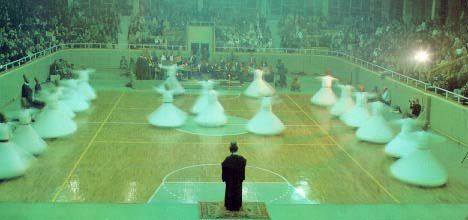

In worship, my hands, resting in my lap, automatically touch, little finger to thumb, right palm up and left palm down. Once a deliberate choice, that touching now had become habitual. Something gained, yet something lost.
This practice started after observing the Whirling Dervishes at their home in Konya, Turkey. (Whirling is actually a misnomer since it is a slow turning and the master stops any participant whose eyes lose focus.) Their act of worship began, for me, as an entertaining observation of a 'native' practice. Yet, my interest turned, along with their bodies, until I was mesmerized by the solemnity of the evening.
Turning and turning, Dervishes raise the right arm with palm upward, symbolically reaching up to the Divine and receiving the Divine blessing. The other open hand, with palm down, points to the earth, symbolically transmitting God's blessing to the world. Thus, the Dervish symbolically links the divine and the earth, symbolically a conduit for a blessing.
Seated at worship at prayer, little finger touching thumb, palm up and palm down, becomes my physical reminder of that link in worship: a time of reaching out for, and receiving, the Divine Spirit and a time to be reminded of my daily life in the world of which I am so intimately a part. Receiving and sharing that selfsame Spirit brings to mind a line >from a long-forgotten poem: "Christ has no hands but our hands to do his work today."
Of course, the danger inherent in all habitual behavior is an act performed devoid of its meaning, a form without substance, except on those occasions when something jogs the mind into recalling. I work at keeping the act of little finger touching thumb, palm up and palm down, consciously deliberate.
The adoption of this modified Dervish practice caused me to reflect on other habitual actions, My automatic, and often perfunctory, handshake (which was originally a way of showing another that no knife was held to harm) is a way of touching another's life. I now try to be conscious of that touch. The hand over heart causes me to reflect on my country and how I am intertwined with it. These are shorthand ways of expressing thoughts and emotions . . . when I remember.
Indian meditative practices brought a new word to our vocabulary: mantra, the repetitive use of a sound lulling the body and mind and allowing both to enter into a different state of consciousness. That word also led me into uncovering mantras in my own Christian tradition and, then, to the mantra-like quality of other repetitive physical actions and, then, to my current mantra of touching little finger to thumb, palm up and palm down.
From Islamic and Hindu religious practices, from countries
as far away as Turkey and India, I am drawn back into my own religious
heritage and find richer depths to my own spirituality.
--Robert H. Tucker
2 November 1998